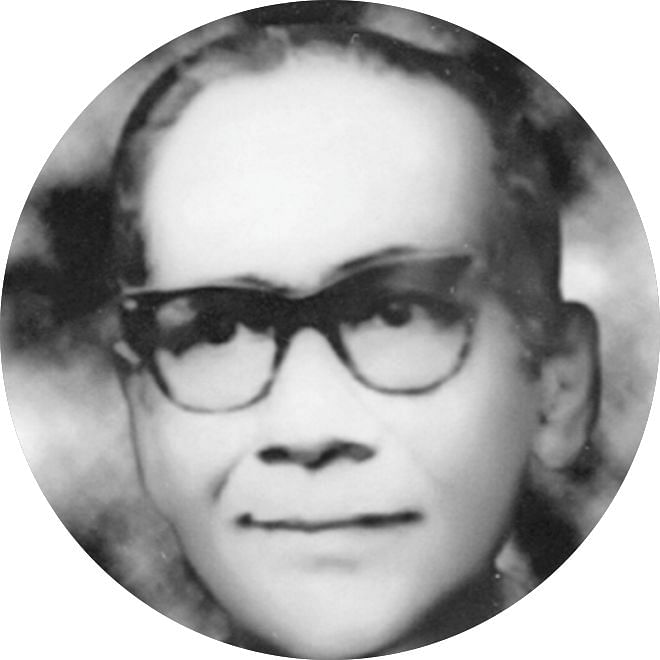Late Justice Murshed: A legend

LATE Justice Murhsed's outstanding legal career and landmark judgments made him well-known both within and outside the legal arena. His commitment to liberty, fairness and justice made him spiritually immortal. Hardly any person can go through a legal career in the Indian sub-continent without hearing the name of Justice Murshed.
Justice Murshed born on January 11, 1911, in one of the most respected and distinguished families (both from the paternal and maternal sides) in Muslim Bengal. His father was Syed Abdus Salek who, after completing a brilliant academic career in the University of Calcutta, joined the Bengal Civil Service and served as a District Magistrate in Bogra and Dinajpur. His mother was Afzalunnesa Begm, the sister of Sher-e-Bangla A.K. Fazlul Haque. Late Justice Murhsed was married to Mrs. Lyla Arzumand Banu, the daughter of Mohammed Zakariah -- a prominent Indian Nationalist and Mayor of Calcutta in 1939.
Justice Murshed completed his matriculation in 1926, standing first in the Calcutta University Matriculation Examination. He obtained BA (Hons) from Presidency College of Calcutta in Economics and MA in Economics from the University of Calcutta in 1930 and 1932, respectively. He obtained LLB degree in 1933 from the University of Calcutta securing a First Class. Justice Murshed then went to the UK for higher legal education. He was called to the English Bar in 1939 and was placed first among the candidates from the then British India.
Justice Murshed had keen interest in literature. Whilst at Presidency College in Calcutta, he once edited the college magazine. He was also an excellent orator, and led the Debating Society of the Calcutta University. He was also a keen sportsman, and was one of the key organisers of Mohamadan Sporting Club in the 1930s.
Justice Murshed began his legal practice at the Calcutta High Court in the early 1940s. He was a junior of the then renowned lawyers Sorot Chandra Boshu and A.B. Khaitun. He made his mark at the Bar at an early age. After the partition of the sub-continent, he joined the then Dacca High Court. In early 1955, Justice Murshed was elevated to the Bench of the Dacca High Court. Some of his famous judgments, including the Ministers Case, the Pan Case, the Basic Democracy Case, the Mehmood Case and the Convocation Case, were all landmarks in the constitutional history of Pakistan. He also served as an Ad Hoc Justice of the Supreme Court of Pakistan in 1962. He served as the Chief Justice of East Pakistan from 1964 to 1967.
Because of his bravery and bold judgments, the then government felt threatened and, as a result, tried to put pressure on him. However, Justice Murshed was a man of principle and conscience. When he thought that he was not able to follow the dictates of his conscience, he resigned from the post of Chief Justice on November 16, 1967.
After resignation, Justice Murshed helped organise the defence of the Agartala Conspiracy Case. He took active part in the 'mass uprising' of 1969. In the roundtable conference called by President Ayub Khan, he advocated for the 11 points of the students of the then Province of East Pakistan. Throughout his eventful career, Syed Murshed was associated with cultural societies and humanitarian activities. He was the founder President of Rotary Club, Lions Club, Pak-China Friendship Association and Bangla-China Friendship Association. He was a life member of Bangla Development Board and Bangla Academy. Justice Murshed was the President of Red Crescent Society in 1956. He established a legal assistance organisation called Legal Aid, which was the first human rights organisation in Bangladesh. The famine of 1943 drew him to the Anjuman-e-Mufidul Islam and the cyclones in the 1960s to the Red Cross Society.
Justice Murshed was a living legend in the Indian sub-continent of the last century. He left behind a legacy for us, of his firm commitment to the principles of liberty, justice, rule of law and the ideals of liberalism. The firmness, boldness and strictness of Justice Murshed in ensuring justice and fairness is most needed in contemporary Bangladesh, where rule of law is being threatened, justice is being politicised, and liberties have become cheap commodities so easily to be taken away. Contemporary judges and lawyers have a lot to learn from the shining and outstanding legal and judicial career of Justice Murshed.
He passed away on April 3, 1979. On his death, the Indian sub-continent in general and Bangladesh in particular lost a great legal icon, a loss that has not been replaced yet and the absence of which is still felt. We remember him with utmost respect on the occasion of his 35th death anniversary. May Almighty grant him the highest place in the Paradise.
The writer is Advocate of the Supreme Court of Bangladesh and Barrister of the Honourable Society of Lincoln's Inn:
E-mail: [email protected]

 For all latest news, follow The Daily Star's Google News channel.
For all latest news, follow The Daily Star's Google News channel. 



Comments